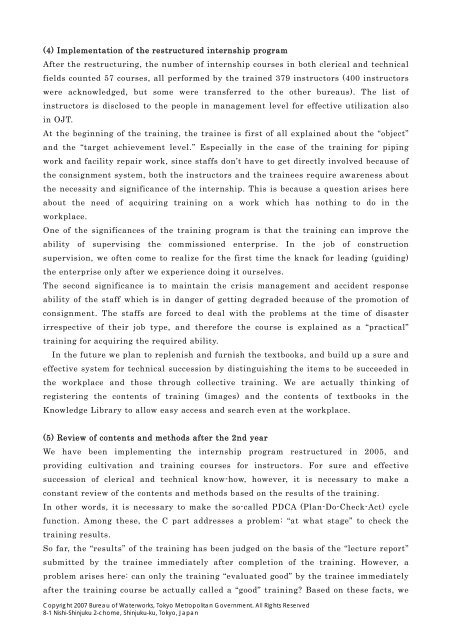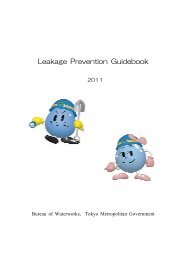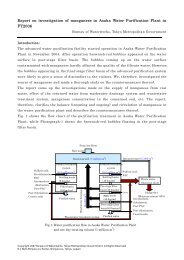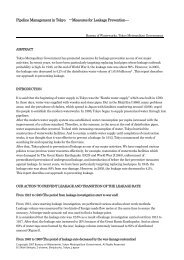Restructuring internship - Bureau of Waterworks Tokyo Metropolitan ...
Restructuring internship - Bureau of Waterworks Tokyo Metropolitan ...
Restructuring internship - Bureau of Waterworks Tokyo Metropolitan ...
You also want an ePaper? Increase the reach of your titles
YUMPU automatically turns print PDFs into web optimized ePapers that Google loves.
(4) Implementation <strong>of</strong> the restructured <strong>internship</strong> program<br />
After the restructuring, the number <strong>of</strong> <strong>internship</strong> courses in both clerical and technical<br />
fields counted 57 courses, all performed by the trained 379 instructors (400 instructors<br />
were acknowledged, but some were transferred to the other bureaus). The list <strong>of</strong><br />
instructors is disclosed to the people in management level for effective utilization also<br />
in OJT.<br />
At the beginning <strong>of</strong> the training, the trainee is first <strong>of</strong> all explained about the “object”<br />
and the “target achievement level.” Especially in the case <strong>of</strong> the training for piping<br />
work and facility repair work, since staffs don’t have to get directly involved because <strong>of</strong><br />
the consignment system, both the instructors and the trainees require awareness about<br />
the necessity and significance <strong>of</strong> the <strong>internship</strong>. This is because a question arises here<br />
about the need <strong>of</strong> acquiring training on a work which has nothing to do in the<br />
workplace.<br />
One <strong>of</strong> the significances <strong>of</strong> the training program is that the training can improve the<br />
ability <strong>of</strong> supervising the commissioned enterprise. In the job <strong>of</strong> construction<br />
supervision, we <strong>of</strong>ten come to realize for the first time the knack for leading (guiding)<br />
the enterprise only after we experience doing it ourselves.<br />
The second significance is to maintain the crisis management and accident response<br />
ability <strong>of</strong> the staff which is in danger <strong>of</strong> getting degraded because <strong>of</strong> the promotion <strong>of</strong><br />
consignment. The staffs are forced to deal with the problems at the time <strong>of</strong> disaster<br />
irrespective <strong>of</strong> their job type, and therefore the course is explained as a “practical”<br />
training for acquiring the required ability.<br />
In the future we plan to replenish and furnish the textbooks, and build up a sure and<br />
effective system for technical succession by distinguishing the items to be succeeded in<br />
the workplace and those through collective training. We are actually thinking <strong>of</strong><br />
registering the contents <strong>of</strong> training (images) and the contents <strong>of</strong> textbooks in the<br />
Knowledge Library to allow easy access and search even at the workplace.<br />
(5) Review <strong>of</strong> contents and methods after the 2nd year<br />
We have been implementing the <strong>internship</strong> program restructured in 2005, and<br />
providing cultivation and training courses for instructors. For sure and effective<br />
succession <strong>of</strong> clerical and technical know-how, however, it is necessary to make a<br />
constant review <strong>of</strong> the contents and methods based on the results <strong>of</strong> the training.<br />
In other words, it is necessary to make the so-called PDCA (Plan-Do-Check-Act) cycle<br />
function. Among these, the C part addresses a problem: “at what stage” to check the<br />
training results.<br />
So far, the “results” <strong>of</strong> the training has been judged on the basis <strong>of</strong> the “lecture report”<br />
submitted by the trainee immediately after completion <strong>of</strong> the training. However, a<br />
problem arises here: can only the training “evaluated good” by the trainee immediately<br />
after the training course be actually called a “good” training Based on these facts, we<br />
Copyright 2007 <strong>Bureau</strong> <strong>of</strong> <strong>Waterworks</strong>, <strong>Tokyo</strong> <strong>Metropolitan</strong> Government. All Rights Reserved<br />
8-1 Nishi-Shinjuku 2-chome, Shinjuku-ku, <strong>Tokyo</strong>, Japan







